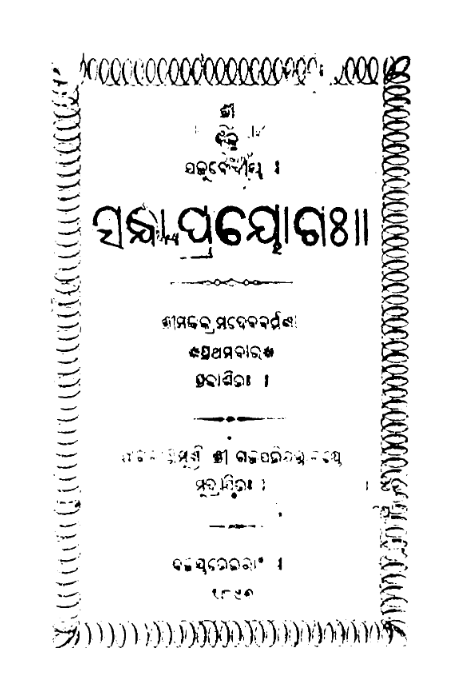Sandhya Prayoga, a remarkable collection of poetry by the celebrated Odia poet Bikramadeba Burma, was published in 1897 and stands as a significant milestone in the development of Odia literature. The title translates to Evening Practices, evoking images of twilight—a time of reflection, transition, and the merging of day into night—with an essence that mirrors the emotional undertones present throughout the verses.
Emerging during the late 19th century, Sandhya Prayoga is not just a work of art but a reflection of the cultural and linguistic renaissance that was taking place in Odisha. This period was marked by a growing awareness of regional identity and a rekindling of literature and language. Bikramadeba Burma’s contributions are pivotal in this context, as he sought to encapsulate the spirit of Odia culture while detailing the intricacies of human emotions, nature, and spiritual contemplation.
Central to Sandhya Prayoga is the exploration of the human experience against the backdrop of nature. The poet employs vivid imagery and sensory details to draw readers into a world where the beauty of the external environment intertwines with internal emotional landscapes. Nature, in its various forms, acts as a dynamic participant in his poetry—symbolizing love, loss, hope, and reflection.
The natural world serves as a central muse in Burma’s poetry. He captures the serene beauty of twilight, evoking a tranquility that resonates with readers. Through descriptions of landscapes, the changing colors of the sky, and the sounds of evening, the poet creates a mesmerizing ambiance that mirrors the emotional complexities of his subjects. This connection between nature and feelings enhances the overall impact of the poetry, making each piece a vivid experience.
Love, both personal and universal, occupies a significant space in Sandhya Prayoga. The verses encapsulate the bittersweet nature of love, oscillating between joy and sorrow. The poet’s exploration of longing—whether for a beloved, lost moments, or a lost sense of belonging—speaks to the depths of human emotion. The intimate dialogues and tender reflections resonate with anyone who has experienced the nuances of love and attachment.
Sandhya Prayoga also delves into spiritual themes, inviting readers to contemplate their place in the universe. The evening symbolizes a time for reflection, and the poet skillfully weaves contemplative verses that encourage the exploration of one’s relationship with the divine. The spiritual inquiries presented in the poetry resonate with the broader human experience, making the work both personal and universal.
Bikramadeba Burma’s Sandhya Prayoga remains a significant contribution to Odia literature and poetry. His ability to intertwine personal and collective experiences within the verses cultivates a profound connection with readers. The work has since inspired new generations of poets and writers to explore their own cultural and emotional landscapes.
Books Info
| Books name | Sandhya Prayoga / ସନ୍ଧ୍ୟା ପ୍ରୟୋଗ |
| Author | Bikramadeba Burma |
| No Of pages | 14 |
| Publisher | NA |
| Publication | 1897 |
| Printed At | NA |
| Distributor | NA |

